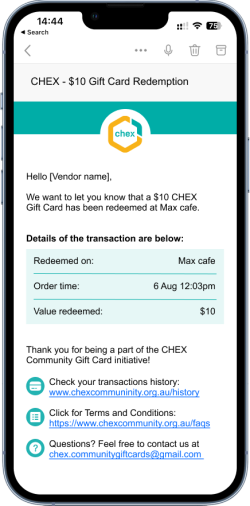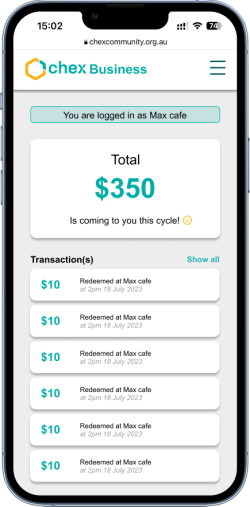
In the inner Sydney suburb of Ultimo, a grassroots program is sharing community finances among residents and businesses alike. Called the CHEX Community Gift Card, this initiative was originally developed as a physical gift card that could be exchanged for goods and services at participating businesses in the Ultimo area.
Now, thanks to a partnership with research innovation hub UTS Rapido, CHEX is about to go digital – and the transformation of this once-humble community program is set to be big.
Co-designing a digital solution
CHEX was developed by the Uniting Harris Community Centre (UHCC), in partnership with Ultimo locals, as a way of invigorating the local economy during the challenges of COVID-19. Local residents would donate to UHCC, who would redistribute the donations in the form of physical CHEX cards. Community members who received a card could ‘spend’ it at one of 9 local businesses.
Businesses would then retain the card for collection by UHCC volunteers, who would reimburse the business and then return the cards to UHCC to be sanitised and re-used. Since it was first established in 2020, the CHEX program has redistributed more than $80,000 to the local community, but its highly manual processes come at the cost of growth.
The original card was very manual – it required a lot of time to process. We needed an automated system to reduce the time we spent on admin so that we could use that time to onboard more businesses, expand the program and focus on those areas that would help the program grow. – Oscar Sanchez, UHCC Coordinator

Supported by funding from a Social Impact Grant and matched funding from the UTS Faculty of Engineering and IT (FEIT), a team of professional engineers at UTS Rapido took on the challenge of creating a new local digital community currency. Combining their user experience and software engineering expertise, they conducted a series of co-design workshops with the UHCC team to drive the project forward.
‘Our solution was essentially to replace the physical card with a QR code,’ says Raj Calisa, Principal Delivery Manager Software at UTS Rapido.
‘Initially, we worked with the UHCC team to document, clarify and confirm the manual processes for the CHEX cards and then we developed a QR code-based storyboard of how it would work from a customer perspective, vendor perspective and CHEX employee perspective.’
Expanding community fortunes
The result is a digital currency that UHCC can distribute via QR code, coupled with a back-end system that tracks how much is being spent at participating businesses. Businesses can use the system to check QR code validity and see how much they’re owed, while the CHEX team can now complete the reimbursement and acquittal processes online.
Instead of cleaning cards, tracking the cards manually, going to the business and giving them paper receipts, everything is controlled by the CHEX portal. – Oscar Sanchez

This digital initiative has huge potential to drive the rapid expansion of the CHEX program: Oscar and his team estimate that digitising the card will result in double or even triple the number of Ultimo businesses signing up to the program in the next six months, with an estimated 400 volunteer hours saved in the first year.
Such an expansion would deliver significant benefits for everyone involved.
‘CHEX follows a circular economy model by building literacy around local community currencies. It really supports everyone who’s part of that,’ says Sanchez.
‘Every dollar that’s donated is instantly multiplied by two, because you’re not only supporting someone in need, you’re also supporting a local business.’
As well as reducing the burden on volunteers and businesses, the new digital process will also pave the way for more streamlined reporting and data capture. This will not only help the CHEX team identify challenges and opportunities for growth within the program, but it will also simplify how they interact with their funders.
‘We’ve been awarded different local government grants to support this process, but with those grants come reports and acquittals,’ says Sanchez.
‘Now, we can flick a button and it gives us a report.’
The trickle-down impacts of doing good
Small-scale university-industry partnerships like this one offer huge benefits to community organisations, who may otherwise be priced out of the expertise that can drive true business transformation.
For Sanchez and his team, the partnership with UTS Rapido has delivered not only the potential for significant expansion but a fast-track towards their goals.
‘They’ve helped us fast forward two years – without their support, it would have taken us another couple of years to get to where we are now,’ he says.
And it’s not just UHCC who has benefitted. These sorts of social impact collaborations matter to researchers, too:
It’s very meaningful. A lot of engineers at UTS Rapido like to work on these socially meaningful projects because the impacts are immediately visible.
We’re also part of a university that exists for the social good, so we need to be working on innovation projects that are beneficial to society. It keeps our social impact program alive and meaningful. – Raj Calisa
The problem
Many people in the Ultimo community are feeling the cost-of-living crisis and struggling to access basic needs. To help those in need, the Uniting Harris Community Centre and members of the Ultimo community launched the CHEX Community Gift Card, to utilise government’s emergency relief funding and donations from the community by directing them to local small business and fostering a circular economy, but the card functioned as a physical copy only.
The response
UTS Rapido proposed to develop a digital solution that would replace the manual processes that Uniting Harris Community Centre currently uses to administer the CHEX community card. This would allow the card to become digital and reach more people.
What helped accomplish this?
UTS Rapido focused on bringing efficiencies in running the CHEX community currency initiative using digital technologies. The project successfully developed and deployed the digital CHEX card, with plans for a field trial in 2024. Throughout the project, partners remained highly engaged and enthusiastic, recognising its significant value.
What has changed as a result?
The digitisation of the CHEX card will save 400 volunteer hours and double the usage of the CHEX card. Now the card is digital, the program itself could be scaled up, by increasing business uptake and rolling it out to other communities.
Project lead
-
 Raj CalisaPrincipal Delivery Manager
Raj CalisaPrincipal Delivery ManagerUTS Rapido

